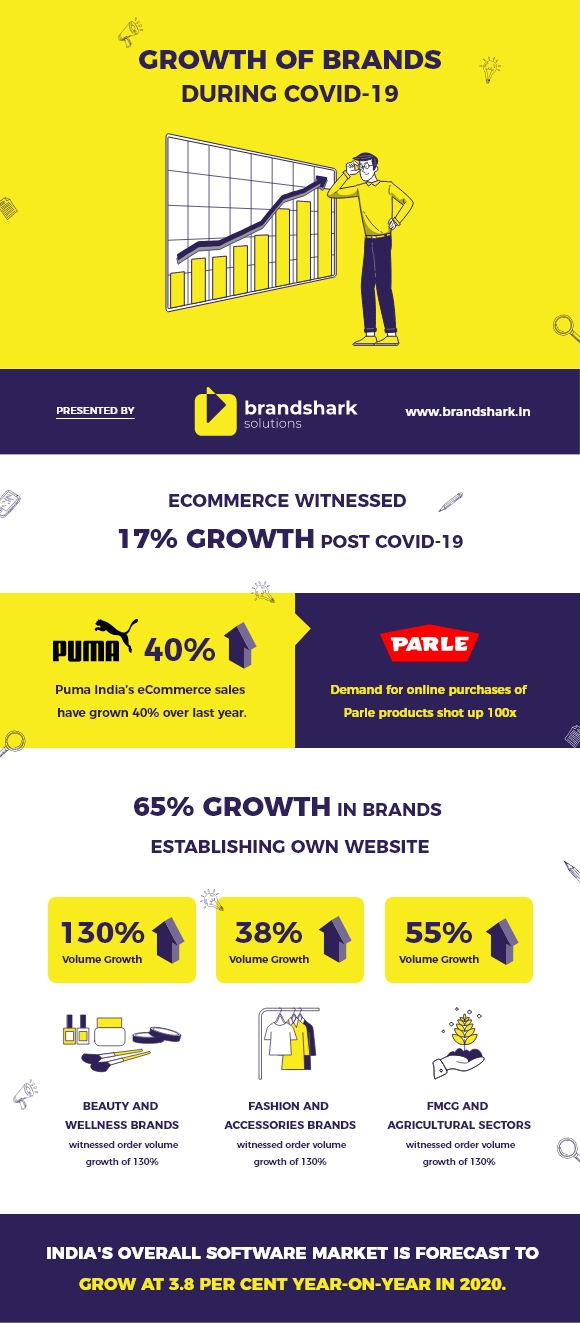Online stores and eCommerce sites are only for selling and buying digital gadgets, books, and branded clothing, right? No. Those days are long gone. The COVID-19 pandemic has caused an acceleration in eCommerce penetration globally driven by consumers’ need for safety and convenience and even in India, online shopping is gaining salience. So, what does this big shift look like for small and medium manufacturers? Can they effectively use technology to create an online store and boost the sales in the upcoming months.
Here’s everything you need to know about the rising online shopping trend in India and how manufacturers can adapt to this trend to start their own online store.
Contents
Why is it a good time for manufacturers to create an online store?
1. The enormous growth of eCommerce in India
As the coronavirus pandemic confined everyone to their homes and shut down physical stores across the country, the retail ecosystem combined with the comfort of shopping at home has turned the tables for the eCommerce sector quite significantly. According to Invest India(https://www.investindia.gov.in/sector/retail-e-commerce), the eCommerce market in India is all set to grow at a CAGR of 30% for gross merchandise value to reach $200 billion by 2026. This has been further accelerated by increasing the affordability of smartphones and cheaper data prices in the country. So, this is a great opportunity for manufacturers to start their own online store and reap the benefits.
2. You can compete with big brands
If you think that this big shift is just for those big brands that have already established their presence in the eCommerce space, you might be missing the big picture here. In the current scenario, having an online store for your business isn’t a luxury, it’s a necessity. It closes the gap between B2B and B2C and enables you to offer products to end-users directly without relying on marketplaces like Amazon or Flipkart. A report by Nielson(https://www.nielsen.com/wp-content/uploads/sites/3/2019/04/future-opportunities-in-fmcg-ecommerce-1.pdf) found that beauty and wellness products manufacturers who established their own online store witnessed an order volume growth of 130%. Similarly, fashion & accessories brands and FMCG & agricultural brands witnessed order volume growth of 38% and 55% respectively.
3. Change in consumer behaviour
With everyone’s eyes fixed on COVID-19 data, the retail market witnessed drastic shifts to the way consumers used to live and consume items they want and need. Online shopping habits in India have increased dramatically since COVID-19. This shift is spanning out of control and consumers are purchasing new product categories. Moreover, consumers are moving away from expensive brands and are looking for affordable goods. Thus, having your own online store for your business gives you a chance to personalize the whole process, genuinely connect with the users, and entice them to shop.
How can manufacturers adapt to this shift and set up their own online stone?
Building a website for your store and managing your product sales are just the tip of the iceberg. You need a clear marketing and branding strategy along with the right digital tools to make use of this online shopping trend. Some of the biggest retail chains have already announced that they are expanding their eCommerce sales. This would be a learning opportunity for all the D2C brands as they will have to further invest in digital technologies and effective branding and marketing techniques to retain that strong connection with the consumers.
So, as a small or medium manufacturing business owner, you need to be geared up with the best launching pad to rise above the competition and see a profit. This is where Brandshark comes in. Brandshark makes your digital transformation journey smoother. We help you create your own brand, build an online store for your business, and empower you with our effective branding strategies that help you stand apart from your competitors.
Here is an infographic we created from our research on how some of the brands are performing digitally during these unprecedented times:

